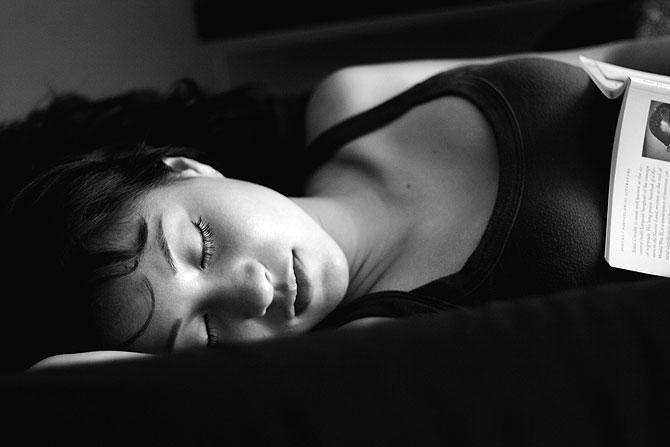 | « Back to article | Print this article |
Lack of sleep makes you look sad and old
Here's a round-up of the latest findings across an array of pressing health issues.
A new study has found that people who stayed up for nearly a day and a half looked sadder and had more apparent wrinkles than when they were well-rested.
The study now confirms that your best beauty trick is to get a good night’s sleep, according to the New York Daily News.
Findings revealed what you have probably seen in the mirror after a rough night: sleep-deprived people look more, shall we say, worn-out, with redder, more swollen eyes, darker under-eye circles, more wrinkles and droopier eyelids and mouths than their well-rested selves.
People also looked sadder when sleep-deprived than after a normal sleep, and this apparent sadness was related to looking fatigued, the researchers said.
Tina Sundelin, author and doctoral student in the department of psychology at Stockholm University in Stockholm, Sweden said that since faces contain a lot of information on which humans base their interactions with each other, how fatigued a person appears may affect how others behave toward them.
She added that this is relevant not only for private social interactions, but also official ones such as with health care professionals and in public safety.
Men more likely to suffer depression than women
A new study has revealed that severe depression may be even more common in men than in women, if the symptoms are properly recognized in men.
This new research is in contrast to long-accepted norm that suggests, over their lifetimes, women are 70 percent more likely to have major depression than men, Stuff.co.nz reported.
Dr Andrew Leuchter, a psychiatrist who studies depression at UCLA, said that when it comes to depression in men, to some extent people have blinders on.
Leuchter asserted that they have not been asking about and taking into account a range of symptoms that may be gender-specific.
In the research, when a group of nearly 5700 American adults were assessed using the “gender inclusive depression scale,” which included widely recognised depressive symptoms like sadness and hopelessness, 30.6 percent of men and 33.3 percent of women were found to have experienced a depressive episode at some point in their lives.
Additionally, when the subjects were evaluated with the “male symptoms scale,” 26.3 percent of men and 21.9 percent of women were said to have experienced a major depressive occurrence in their lifetimes.
The difference, unlike the previous gap which was so narrow it may have been a statistical fluke, was large enough that it could not be due to chance, the researchers said.
The study is published by the journal JAMA Psychiatry.
Eating mushrooms can increase Vitamin D level
A new study has claimed that more than one-third of populations worldwide may have low levels of vitamin D.
Principal investigator, Dr. Kristina Hoffmann of the Mannheim Institute of Public Health, Medical Faculty Mannheim, Heidelberg University said that the strength of their study is that they used strict inclusion criteria to filter and compare data, using consistent values for 25(OH)D.
Hoffmann said that although they found a high degree of variability between reports of vitamin D status at the population level, more than one-third of the studies reviewed reported mean serum 25(OH)D values below 50 nmol/l.
The new systematic review used continuous values for 25(OH)D to improve comparisons. The result has been published in the British Journal of Nutrition.
Meanwhile an Australian scientist has found that eating three or four button mushrooms a day is sufficient to make vitamin D for the average person’s estimated daily needs.
Professor Rebecca Mason, head of physiology at Sydney Medical School and past president of the ANZ Bone and Mineral Society has found that like humans, button mushrooms also need exposure to sunlight for the photochemical manufacturing to kick into action, News.com.au reported.
Mason said that button mushrooms need two hours unwrapped on a plate in the midday summer sun and a bit longer in winter to get the vitamin D boost, and placing them a couple of extra hours in the shade will allow time for the full chemical reaction.
Mason said that eating three or four button mushrooms every day is enough for active people, while people who are housebound could up their dose of button mushrooms to increase their levels of vitamin D.
Listening to music is good for the heart
Researchers have discovered that listening to your favourite music substantially improves endothelial function in Coronary Artery Disease.
The study evaluated the effects of listening to favourite music on endothelial function through changes of circulating blood markers of endothelial function: the stable end products of nitric oxide, asymmetric dimethylarginine, symmetric dimethylarginine and xanthine oxidase in 74 patients with stable CAD.
Professor Deljanin Ilic said that the combination of music and exercise training led to the most improvement in endothelial function. Improvements in endothelial function were associated with significant improvements in exercise capacity.
“Listening to joyful music for 30 minutes has been associated with improved endothelial function,” she said.
Working night shifts hazardous to women's health
Women who work for years on night shift are at a higher risk of contracting type-II diabetes as well as overweight and smoking, according to two US studies.
The researches conducted by Prof. Ido Sholat of the Technion-Israel Institute of Technology’s Rappaport Medical Faculty and Rambam Medical Center in Haifa, have found that the reason behind this is a disruption of the circadian rhythm, a roughly 24-hour cycle in the physiological processes of living beings, the Jerusalem Post reported.
Disruptions of the circadian rhythm involve a complex process in the sleep cycle, energy balance, body heat, cell cycles and the production of hormones.
The studies were published in the Israel Journal of Obstetrics and Gynecology.
Gaining weight can improve your mental health
A new study has found that while physical health deteriorates when weight is gained, mental well-being seems to improve, especially in women.
These results by scientists from the Helmholtz Zentrum Munchen offer valuable information for preventive strategies in the fight against obesity.
Scientists from the Institute of Health Economics and Health Care Management and from the Institute of Epidemiology II discovered that weight gain leads to deterioration in physical health.
Female study participants, however, experienced improved mental quality of life as their weight increased, a result that was observed even in women who were already overweight when the study began.
For this study, Professor Dr Rolf Holle, Michael Laxy and their team evaluated data from the population-based longitudinal KORA study on the association between body weight and health-related quality of life.
Over a period of seven years, the weight of more than 3000 people was measured, the body-mass index was calculated and the health-related quality of life was assessed on the basis of a standardized questionnaire.
The study is published in the International Journal of Public Health.
Physical activity cuts risk of sudden cardiac death in unfit men
Physical activity decreases the risk of sudden cardiac death (SCD) in men with low cardiorespiratory fitness, a new study has revealed.
The research by Dr Jari Laukkanen, who investigated the impact of high leisure-time physical activity (LTPA) combined with cardiorespiratory fitness (CRF) on risk of SCD, included 2,656 randomly selected men aged 42 to 60 years from the Kuopio Ischemic Heart Disease Risk Factor Study.
LTPA was assessed using a 12-month physical activity questionnaire.
The study suggested that men with low cardiorespiratory fitness and high LTPA did not have a statistically significant increased sudden cardiac death risk compared to men with high CRF and high LTPA.
“This indicates that a higher amount of leisure-time physical activity might reduce the risk of SCD among men with low cardiorespiratory fitness,” Laukkanen said.
He added that the study showed that exercise training and high leisure-time physical activity may be especially important in individuals with low cardiorespiratory fitness.
Even brief bouts of exercise can prevent weight gain
A new research has revealed that to prevent weight gain, the intensity of the activity matters more than duration.
University of Utah researchers found that even brief episodes of physical activity that exceed a certain level of intensity can have as positive an effect on weight as does the current recommendation of 10 or more minutes at a time.
It was suggested that taking the stairs, parking at the far end of the lot, and walking to the store or between errands are choices that can add up and can make a positive health difference.
Subjects for the study were drawn from the National Health and Nutrition Examination Survey, NHANES, and participants from 18 to 64 years of age were drawn from the database.
Researchers compared measurements of physical activity based on length of time and intensity.
Four categories were created: higher-intensity bouts (greater than 10 minutes exertion at greater than 2,020 counts per minutes), higher-intensity short bouts (less than 10 minutes at greater than 2,020 CPM), lower-intensity long bouts (greater than 10 minutes and less than 2,019 CPM), and lower-intensity short bouts (less than 10 minutes and less than 2,019 CPM).
The study used body mass index to measure weight status.
Results showed that when women each 5-feet-5-inches tall were compared, the woman who regularly adds a minute of brisk activity to her day will weigh nearly a half-pound less. Results were similar for men.
Importantly for both, each daily minute of higher-intensity activity lowered the odds of obesity - 5 percent for women, and 2 percent for men.
In a new study was published in the American Journal of Health Promotion.







